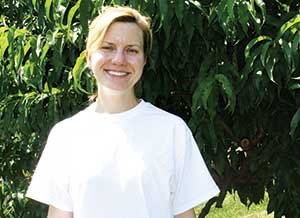
Kari Peter, the new plant pathologist at Penn State, will serve fruit growers in three states.
by Richard Lehnert
Three eastern universities have agreed to work together to coordinate their hiring of faculty members serving fruit growers.
Informally called the Mid-Atlantic Fruit Consortium, it’s built on a memorandum of understanding among the agriculture colleges of Pennsylvania State University, University of Maryland, and West Virginia University.
“It is a productive way to leverage resources and minimize duplication,” said Gary Thompson, associate dean for research and graduate education at Penn State.
The idea was developed by extension directors in each of the states, but it’s not an extension collaboration, he said. It’s a faculty and research collaboration.
The person is on one university’s faculty, but his or her research programming is designed to serve the needs of the multistate area.
“We’ve agreed to coordinate our hires,” Thompson said. “But each person is a full member of the faculty of one of the universities. Sharing money among universities is not easy.”
Dr. Kari Peter is the first person to be hired under the arrangement. She is the new tree fruit plant pathologist at Penn State University. Maryland is in the process of hiring a horticulturist for small fruits and grapes. “As new hires come on, they will all be hired this way,” Thompson said.
“Fruit production problems don’t end at state borders,” he added. “It really makes sense for our area. In many ways, we’ve been doing this anyway.” Researchers from these universities, and others, come together in winter for the Mid-Atlantic Fruit and Vegetable Convention in Hershey, Pennsylvania. And researchers commonly make presentations in neighboring states.
“Maryland has not had a tree fruit pathologist in ten years,” Peter told growers during the annual field day at Penn State’s Fruit Research and Extension Center in Biglerville in July.
Hired March 1, Peter began setting up a tree fruit pathology Web site and is contributing to Fruit Notes to keep growers up-to-date on diseases.

Leave A Comment